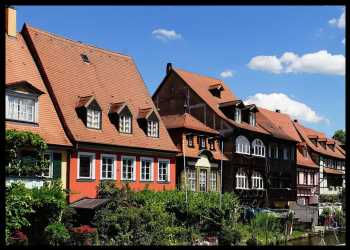House prices in Germany declined in the second quarter at the fastest pace since 2000, adding further evidence to the adverse impact of rising interest rates on the real estate market in the biggest euro area economy.
Prices of residential property decreased by an average 9.9 percent year-on-year, the statistical office Destatis said Friday. This was the biggest annual fall since the start of the time series in 2000.
In the same quarter last year, the house price index hit a record high. But they have been falling quarter-on-quarter since then, the statistical office observed.
In the second quarter, house prices fell 1.5 percent from the previous three months after a 2.9 percent slump in the first quarter. In the fourth quarter of 2022, prices had declined 5.1 percent.
Official data released earlier this month showed that apartment permits granted during January to July were 27.8 percent lower than in the same period last year.
Separate survey data suggest the crisis in the German residential construction sector has intensified in recent months.
The number of housing project cancellations hit a new high in August, mainly due to rising costs and higher interest rates the ifo Institute said last week.
“The uncertainty in the market is huge,” Head of Surveys at ifo Klaus Wohlrabe said.
In addition to the surge in construction costs and higher interest rates, which have made many projects that were still profitable in early 2022 no longer viable, the scaling back of subsidies due to tighter energy regulations is putting a strain on builders’ calculations, ifo said.
The ifo survey also showed that 44.2 percent of companies reported a lack of orders for housing in August, up from 40.3 percent in July. In the same month last year, the share was only 13.8 percent.
The latest purchasing managers’ survey by S&P Global had shown that Germany’s construction activity continued its downward trend in August amid a steep fall in residential building projects due to the impact of rising interest rates.
The PMI survey showed that housing activity contracted at the fastest rate in thirteen-and-a-half years.
Both the ifo and the PMI surveys showed that business expectations among house builders deteriorated as they expect further decline in business going forward.
The European Central Bank raised its key interest rates for a tenth policy session last week, but has signaled a pause ahead, despite policymakers assessing inflation to remain “too high, too long”, as Eurozone economy slows.
Source: Read Full Article
-
Bank Of England Intervenes In Bond Market To Restore Stability
-
Baidu To Offer China’s First-ever Commercial Fully Driverless Robotaxi Services
-
IOC, Adani-Total, Shell, 26 other firms lap up Reliance’s KG-D6 gas
-
Marshall B. Grossman Dies: L.A. Power Lawyer Who Repped Steven Spielberg, Clint Eastwood, Netflix & Many Others Was 84
-
Private equity-backed mergers and acquisitions fall to 31-month low

